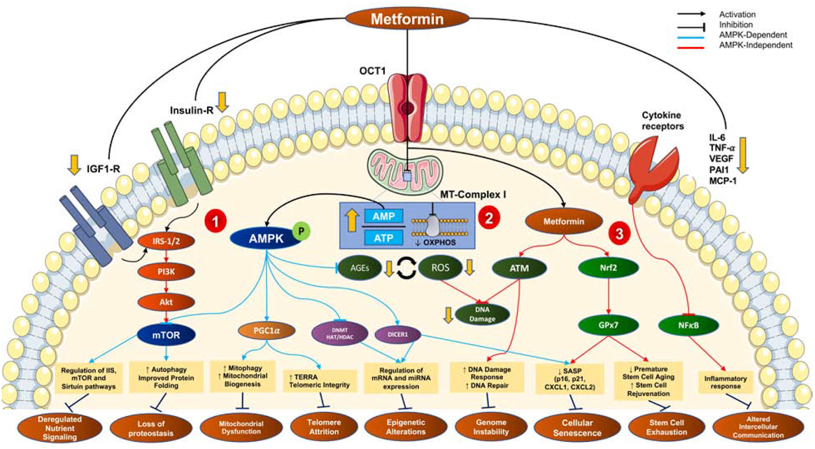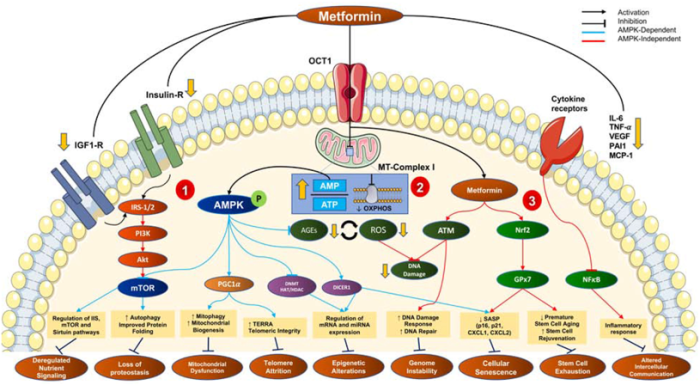Name: Metformin
Class: Biguanide antidiabetic drug
Alias(es): CAS# 657-24-9, Synonym: 1,1-Dimethylbiguanide, Brand Names
Background: Metformin, is a biguanide, a type of glucose lowering medication, and has been used as a first-line treatment for Diabetes Type 2 for over 60 years. Currently it is only available with a doctor’s prescription. Metformin has been of particular interest in aging research because multiple study types, from epidemiological studies to clinical studies to association studies, have found that metformin decreases incidence of age-related diseases and mortality[1]. It is particularly telling that diabetics taking metformin liveda median of 15% longer than matched non-diabetics (not taking metformin) according to a large retrospective observational study[2]. The soon to be launched TAME trial (Targeting Aging by Metformin), coordinated by the American Federation of Aging Research (AFAR), may be able to confirm metformin’s efficacy in slowing aging.
Is there evidence it works in humans for aging?
Retrospective Observational Study:
Diabetics taking metformin lived statistically significantly 15% longer than matched non-diabetics not taking metformin according to a large retrospective observational study published in 2014 in the journal Diabetes, Obesity and Metabolism. This is very compelling evidence that use of metformin for treating aging in non-diabetic individuals may be effective in extending median lifespan.
Completed Clinical Trials with Published Results:
NCT02308228: (Completed: December 14, 2017). Title: (MASTERS) Metformin to Augment Strength Training Effective Response in Seniors .
Summary: This early phase 1, double-blind, placebo-controlled trial sought to determine whether metformin enhances the benefits of progressive resistance strength training to counteract the strength loss that is seen in the elderly.
Result: Metformin blunts muscle growth in response to strength training. See details here.
NCT02432287: (Completed: December 2017). Title: (MILES) Metformin in Longevity Study .
Summary: This phase 4, double-blind, placebo-controlled crossover trial sought to elucidate whether treatment with metformin will restore the gene expression profile of older adults with impaired glucose tolerance (IGT) to that of young healthy subjects.
Results: Results are available. Below is a summary of the results, as presented in a review article by Mohammed et al., 2021.
647 genes were differentially expressed in muscle versus 146 in adipose tissue affecting both metabolic and non-metabolic pathways
Changes in DNA repair, changes in collagen gene expression, in adipose tissue changes were observed in fatty acid and lipid metabolism, in skeletal muscle changes in pyruvate metabolism, NAD biosynthesis, and down regulation of PARP1 were observed (The latter suggesting an effect on mitochondria function).
Conclusion: Preliminary evidence implys metformin affects transcription and pathways affecting healthspan and lifespan.
NCT01765946: (Completed: March 2013). Title: Effects of Metformin on Longevity Gene Expression and Inflammation and Prediabetic Individuals. A Placebo-controlled Trial
For full results, see paper by Kreutzenberg et al., 2015 linked here: https://www.nmcd-journal.com/article/S0939-4753(15)00077-0/fulltext
Summary of Results: Although Metformin treatment did affect expression of longevity genes, many of these changes were not significant when compared to placebo. Additionally, some observed changes contradict previous studies (i.e. they found that metformin activates MTOR expression).
Completed Clinical Trials and No Results Yet:
NCT03309007: (Completed August 20, 2020). Title: A Double-Blind, Placebo-Controlled Trial of Anti-Aging, Pro-Autophagy Effects of Metformin in Adults With Prediabetes.
NCT03451006: (Completed: December 16, 2021). Title: (MATE) Metformin and Aging Trial in the Elderly: A Pilot and Feasibility Study.
NCT03072485: (Completed: February 22, 2019). Title: Phase 1 Study of the Effects of Combining Topical FDA-approved Drugs on Age-related Pathways on the Skin of Healthy Volunteers
NCT03996538: (Completed: February 4, 2020). Title: Vaccination Efficacy With Metformin in Older Adults: A Pilot Study
Currently Active, Not Recruiting Clinical Trials:
NCT03713801: Title: Metformin and Vaccine Response in Older Adults.
Summary: To determine whether metformin (MET) can improve the immune response to the pneumococcal conjugate vaccine (PCV-13) in older adults.
Currently Recruiting Trials Accepting Healthy Volunteers:
NCT04375657: Title: (TRIIM-X) Thymus Regeneration, Immunorestoration, and Insulin Mitigation Extension Trial
NCT04264897: Title: Does Insulin Sensitivity Impact the Potential of Metformin to Slow Aging.
Also called (ANTHEM) “Antecedent Metabolic Health and Metformin Aging Study.”
NCT04221750: Title:Lifestyle Intervention Plus Metformin to Treat Frailty in Older Veterans With Obesity
Also called (DEMFOS) “Diet and Exercise Plus Metformin to Treat Frailty in Obese Seniors.”
NCT03107884: Title: Metformin to Prevent Inactivity-induced Loss of Muscle Health During Aging
Also called “Role of Metformin on Muscle Health of Older Adults.”
New Clinical Trials (Not Yet Recruiting):
NCT04994561: Pilot Study to Test the Safety and Efficacy of Metformin, Dasatinib, Rapamycin and Nutritional Supplements (Bio-quercetin; Bio-fisetin; Glucosamine; Nicotinamide Riboside; Trans-resveratrol) in Reducing Clinical Measures of Aging in Older Adults
The Targeting Aging with Metformin (TAME) Trial. This soon to be launched trial, which is receiving funding coordinated by the American Federation of Aging Research (AFAR), may be able to confirm metformin’s efficacy in slowing aging.
Is there evidence it works in preclinical studies for aging?
Several Notable Preclinical Studies:In C. elegans, raising on metformin extended median lifespan by 27% at high dose, but had no effect at lower doses (Onken et al., 2010). However, another study in C. elegans found that while early life metformin administration extended lifespan at all doses, it was ineffective when administered in mid-life C. elegans, and in late life it was lethally toxic in both C. elegans and human primary fibroblasts (Espada et al., 2020).
In mice, low dose (0.1% w/w) metformin administered in middle-age extended mean lifespan by 5.83% w/o affecting body weight, but high dose (1% w/w) was toxic and decreased lifespan by 14.4% (Martin-Montalvo et al., 2014).
See Table 1 in a 2021 review paper by Mohammed et al. for more studies focusing on metformin’s effect on lifespan. Also, see Table 1 in Benefits of Metformin in Attenuating the Hallmarks of Aging review paper, published in Cell Metabolism in 2020 for a list of preclinical studies and their outcomes.

Figure 1 above is also from the Benefits of Metformin in Attenuating the Hallmarks of Aging review paper. It shows the mechanism by which metformin is thought to slow the progression of each of the nine hallmarks of aging, as demonstrated in cell lines and model organisms.
Are there known safety concerns?
The FDA drug label for Glumetza describes known side effects of use for metformin, although it is limited mainly to use in type 2 diabetes patients.
Metformin has been thoroughly studied (over 60 years of use) and has been found to have a high safety profile, usually having only minor short-lasting side-effects, such as gastrointestinal discomfort. In long-term administration it can cause vitamin B12 levels to fall, which may require B12 supplementation. Metformin is also known to raise lactate levels to within the normal limits, but this can cause a condition called Metformin Associated Lactic Acidosis (MALA) in patients who have a pre-existing severe liver, kidney, or heart condition.
The summary of the safety info above was obtained from a 2020 review by Kulkarni et al., originally published in the journal Cell Metabolism. It is a thorough review by researchers at Albert Einstein College of Medicine and the National Institute of Health (NIH) who advocate for the importance of launching the TAME trial.
Literature Cited:
- Kulkarni, A. S., Gubbi, S., & Barzilai, N. (2020). Benefits of Metformin in Attenuating the Hallmarks of Aging. Cell Metabolism, 32(1), 15–30. https://doi.org/10.1016/j.cmet.2020.04.001
- Bannister, C. A., Holden, S. E., Jenkins-Jones, S., Morgan, C. Ll., Halcox, J. P., Schernthaner, G., Mukherjee, J., & Currie, C. J. (2014). Can people with type 2 diabetes live longer than those without? A comparison of mortality in people initiated with metformin or sulphonylurea monotherapy and matched, non-diabetic controls. Diabetes, Obesity and Metabolism, 16(11), 1165–1173. https://doi.org/10.1111/dom.12354

